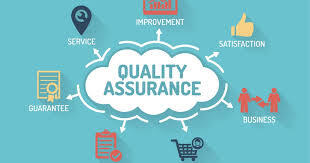The importance of Quality Assurance and testing in eCommerce Excellent e-commerce sales have increased steadily. The increase is anticipated to continue for many years, if not decades. Around the globe, internet sales account for more than two-thirds of businesses’ income, according to Statista. According to the website, about one billion digital shoppers will grow globally between 2019 and 2022, and this trend is predicted to continue.
Businesses are attempting to increase online sales as customers purchase more online. E-commerce websites are one of the most critical components of online purchasing. When making purchases online, modern customers are more picky and discerning. They seek websites that provide an engaging and user-friendly online purchasing experience. E-commerce businesses are scrambling to meet online customers’ needs.
Ecommerce business operators strive to provide their clients with updated features and updates as soon as they become available. This may be detrimental since websites that aren’t evaluated quickly may be underperforming or, in the worst-case scenario, on the verge of collapsing. E-commerce website quality problems may lead to happier consumers and missed marketing and sales opportunities. Rapid and efficient testing is essential for every e-commerce company wanting superior customer service and profit.
Quality Assurance and testing has become critical as eCommerce websites get more complex to ensure they keep up with shifting market trends. Therefore, QA plays a crucial part in the eCommerce ecosystem. A quality assurance team strives to stop errors from happening again on your website. This enhances its overall performance and makes it simpler to add enhanced features and products down the road. You may reduce costs and have a competitive edge with your website if you implement adequate quality assurance.
How Do You Approach Testing for Quality Assurance?
Ensuring an eCommerce website satisfies requirements for completeness and quality is known as Quality Assurance and testing. A team of individuals with knowledge of software development techniques but without development experience may also do Quality Assurance and testing. These individuals are known as “QA testers,” and businesses often employ them to perform this task. QA testers assess the website as it is at the moment. They’ll try it and report back on their findings. Experts in quality assurance test software and websites to see whether they adhere to specifications or if bugs need to be fixed. Whether programmers modify the software, testers for quality assurance may also help ensure everything functions correctly and look for mistakes in those modifications. Software Quality Assurance and testing use several testing methods. Ecommerce testing checklist is provided below.
- Functionality testing
- Usability Testing
- Database Testing
- Performance testing
- Security testing
- Mobile Application Testing
- Test and Evaluation
- Risks Avoided by Quality Assurance and testing
ECommerce testing may reduce a number of website quality hazards, including:
Absence of an internet shop
This is a typical issue during holidays like Black Friday. Online retailers may cease operations because of traffic volume. To avoid your eCommerce website coming down on Cyber Monday, your quality assurance manager or team may do a QA audit in advance!
Poor search engine performance
The inadequate search capability on a website indicates that users do not need help to find what they want quickly or easily. Website owners should avoid this because it results in poor client satisfaction and conversion rates. Through testing the website across various browsers, devices, and internet connections, a QA analyst can help you prevent this issue. By doing this, they will be able to determine, compared to other browsers and devices, which are more likely to result in problems with your website’s operation or design. The next step in avoiding this issue is to simulate sluggish internet connections or Wi-Fi disconnections to evaluate the website’s functionality across various internet connections.
The slow loading pace
Websites that load slowly may have a high bounce rate, poor client satisfaction, and lower sales. Quality assurance is crucial for website owners since it allows them to see any issues before they impact their website. It also guarantees seamless page loading across various browsers and devices.
Inadequate shopping cart functioning
Including quality assurance in the design and development process can avoid poor shopping cart functionality. This will guarantee that all prerequisites are satisfied before the product is released to the public.
Inaccurate analytics
Quality assurance involves verifying that a product or service satisfies specific requirements. It also entails offering a website with minimal glitches and other mistakes. Analytical errors may be deceptive. It could mislead you about your website’s performance. Quality assurance is key to preventing subpar metrics.
Which features do QA testers examine on eCommerce websites?
Functionality of websites for various user situations
- A quality assurance tester will verify that the website is appropriate for multiple user situations. They may use these procedures to test their website:
- Determine the user scenario the tests are intended for.
- Determine the tasks the user will do on the website.
- Make a list of every page on the website and note the contents of each one.
- Determine whether pages include material that might be affected by modifications to usability or accessibility.
- Make a test strategy outlining how to test every page and determine if a task is successful.
- Test every page of your plan and adjust as necessary depending on the tester’s input and your observations of how well things function in real-world situations.
- Testing whether a web browser is compatible with a website involves comparing it to other browsers and determining whether it satisfies the criteria.
Workflow for applications
Finding all possible risks to eCommerce websites’ quality is part of the application testing process. Threats from outside sources, like suppliers, are another category of risk. Inspection points allow QA testers to monitor website quality at various phases. The quality assurance professional initiates remedial action when there is malfunctioning or subpar functionality.
Reactivity on mobile devices
Producing content suited to handheld devices is just one aspect of mobile responsiveness. It involves making sure that every component on your website—navigation, forms, buttons, menus, photos, videos, and more—is usable by web visitors. Web designers and developers have a quality assurance problem with mobile responsiveness. Businesses and organizations that want to connect with their clients on the road should also consider it.
Evaluation of security and vulnerability
QA engineers perform security and vulnerability evaluations during software development. To ensure software security, QA engineers need to perform this evaluation as soon as possible. An assessment must also be completed before every updated version or upgrade of the program is released.
Integration of social media
Businesses are increasingly embracing social media to interact with their clientele and track and evaluate their target market’s behavior. Social media integration is becoming increasingly common as a quality assurance technique used by many businesses. Businesses utilize social media sites like Facebook, Twitter, and others to get customer evaluations and comments.
Important lessons learned
Quality assurance and its role in eCommerce should be emphasized for online retailers. It is essential that the website operates at peak efficiency, connects with its intended audience, and provides a positive user experience—all necessary for drawing in and keeping consumers.
Early consideration of quality assurance services in the design and development phase is crucial as it may prevent significant problems with the website or software. Additionally, quality assurance services facilitates future website changes and feature additions.
CodeSuite offers Quality Assurance and testing to ensure their eCommerce shop functions properly and provides a positive user experience. Your website will draw in and keep the intended audience if it offers a first-rate online consumer experience. To get started, please schedule a call with us immediately.




